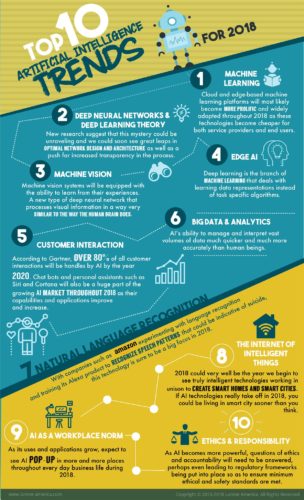Artificial Intelligence (AI) is a complicated and popular topic across multiple industries as innovations throughout the field make leaps and strides. The team at hardware manufacturing company Lanner put together a list of what the most exciting topics in AI are in 2018. See the list below and read more about some key benefits of AI to manufacturers.
Lanner's Top 10 AI Trends in 2018:
1. Machine learning: Machine learning (ML) is the branch of artificial intelligence that focuses on equipping machines with the ability to learn without human intervention or programming.
2. Deep neural networks & deep learning theory: Deep neural networks (DNNs) are artificial neural networks that contain multiple hidden layers between their input and output layers, occasionally referred to as “stacked” neural networks. Deep learning is the branch of machine learning that deals with learning data representations instead of task specific algorithms.
3. Machine vision: With artificial intelligence, machine vision systems will be equipped with the ability to learn from their experiences.
4. Edge AI: One of the most interesting differences between human brains and artificial intelligence tools is the location the “processing” takes place. With AI, the majority of processing and analysis is done in cloud servers rather than on edge devices due to the large data and computing power they require.
5. Customer interaction: According to Gartner, over 80% of all customer interactions will be handles by an AI by the year 2020.
6. Big data & analytics: AI’s ability to manage and interpret vast volumes of data much quicker and much more accurately than human beings is what sets it aside as a potentially revolutionary technology.
7. Natural language recognition: One of the biggest challenges for artificial intelligence technologies has been interpreting intent from the natural language human beings use.
8. The Internet of Intelligent Things: The widespread adoption of AI technologies alongside the continuing expansion of the Internet of Things will begin to build upon the technological foundations laid by previous associated technologies.
9. AI as a workplace norm: With a growing product base and many more innovations lingering on the horizon, 2018 could also be the year artificial intelligence becomes an everyday technology for a large number of businesses and organizations.
10. Ethics & responsibility: As the computational power and responsibilities given to AI grow, more attention will need to be given to the ethical considerations of artificial intelligence.
Click to enlarge
















